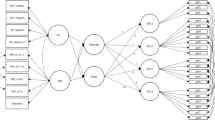Abstract
Perry's scheme of intellectual and ethical development was examined for sex differences with respect to areas of identity concern for which sex differences have been suggested: occupational choice, interpersonal relationships, and sexual identity. The content area of religion and ego development, as measured by Loevinger's sentence completion test (SCT), were also examined. Thirty-one females and 29 males participated. An interview format which applied Perry's unstructured approach to each of the four areas was utilized. Transcribed interviews and SCTs were rated blind. Structural as well as content analyses were performed. Structural analyses revealed no significant sex differences overall or by content area. However, multiple and stepwise regression analyses revealed patterns in which male personality processes consistently focused upon occupational issues while female processes focused upon interpersonal and sexual issues. Ego development was found to be highly correlated with intellectual development for men but unrelated for women. Content analyses suggest that women focus their interpersonal worlds developmentally upon issues of trust while men focus upon issues of rightness. Results are interpreted in the context of recent works by Gilligan concerning sex differences in development.
Similar content being viewed by others
References
Alishio, K. C. (1981). Scoring manual for analyzing Perry-style interviews. Unpublished working manual, Miami University.
Chodorow, N. (1978).The Reproduction of Mothering, Univ. of California Press, Berkeley.
Clinchy, B., Lief, J., and Young, P. (1977). Epistemological and moral development in girls from a traditional and progressive high school.J. Educ. Psychol. 69: 337–343.
Davidson, M. L., King, P. M., Kitchener, K. S., and Parker, C. A. (1980). The stage sequence concept in cognitive and social development.Dev. Psychol. 16: 121–131.
Erikson, E. H. (1963).Childhood and Society, Norton, New York.
Erikson, E. H. (1968). (1968).Identity: Youth and Crisis, Norton, New York.
Gilligan, C. (1982).In a Different Voice: Psychological Theory and Women's Development, Harvard Univ. Press, Cambridge, Mass.
Harvey, O. J., Hunt, D. E., and Schroder, H. M. (1961).Conceptual Systems and Personality Organization, Wiley, New York.
Hodgson, J. W., and Fischer, J. L. (1979). Sex differences in identity and intimacy development in college youth.J. Youth Adoles. 8: 37–50.
Josselson, R., Greenberger, E., and McConochie, D. (1977). Phenomenological aspects of psychosocial maturity in adolescence. Part II: Girls.J. Youth Adoles. 6: 145–167.
Knefelkamp, L. L., Widick, C., and Stroad, B. (1976). Cognitive-developmental theory: A guide to counseling women.Couns. Psychol. 6: 15–19.
Kohlberg, L. (1969). Stage and sequence: The cognitive-developmental approach to socialization. In Goslin, D. A. (ed.),Handbook of Socialization: Theory and Research, Rand-McNally, Chicago.
Kurfiss, J. (1977). Sequentiality and structure in a cognitive model of college student development.Dev. Psychol. 13: 565–571.
Loevinger, J. (1976).Ego Development: Conceptions and Theories, Jossey-Bass, San Francisco.
Loevinger, J., and Wessler, R. (1970).Measuring Ego Development: Construction and Use of a Sentence Completion Test, Vol. 1, Jossey-Bass, San Francisco.
Marcia, J. E. (1966). Development and validation of ego identity status.J. Personal. Soc. Psychol. 3: 551–558.
Marcia, J. E., and Friedman, M. C. (1970). Ego identity status in college women.J. Personal. 38: 249–263.
Matteson, D. R. (1977). Exploration and commitment: Sex differences and methodological problems in the use of identity status categories.J. Youth Adoles. 6: 353–374.
Mentkowski, M., Moeser, M., and Strait, M. (1983).Using the Perry Scheme of Intellectual and Ethical Development as a College Outcomes Measure: A Process and Criteria for Judging Student Performance, Alverno College Productions, Milwaukee, Wisc.
Orlofsky, J. L. (1978). The relationship between intimacy status and antecedent personality components.Adolescence. 13: 419–441.
Perry, W. G., Jr. (1968). Patterns of development in thought and values of students in a liberal arts college: A validation of a scheme. U.S. Department of Health, Education, and Welfare, Office of Education, Project 5-0825.
Perry, W. G., Jr. (1970).Forms of Intellectual and Ethical Development in the College Years: A Scheme, Holt, Rinehart & Winston, New York.
Rodgers, R. F. (1979). Perry rater training: Rating Perry instruments. Unpublished working manual, Ohio State University.
Schenkel, S., and Marcia, J. E. (1972). Attitudes toward premarital intercourse in determining ego identity status in college women.J. Personal. 3: 472–482.
Waterman, C. K., and Nevid, J. S. (1977). Sex differences in the resolution of the identity crisis.J. Youth Adoles. 6: 337–342.
Author information
Authors and Affiliations
Additional information
Completing his Ph.D. in clinical psychology at Miami University. Current research interests include adolescent and female development and family therapy.
Received her Ph.D. in clinical psychology from the University of Florida. Current research interests include women's development, assessment, and psychotherapy.
Rights and permissions
About this article
Cite this article
Alishio, K.C., Schilling, K.M. Sex differences in intellectual and ego development in late adolescence. J Youth Adolescence 13, 213–224 (1984). https://doi.org/10.1007/BF02089060
Received:
Accepted:
Issue Date:
DOI: https://doi.org/10.1007/BF02089060




